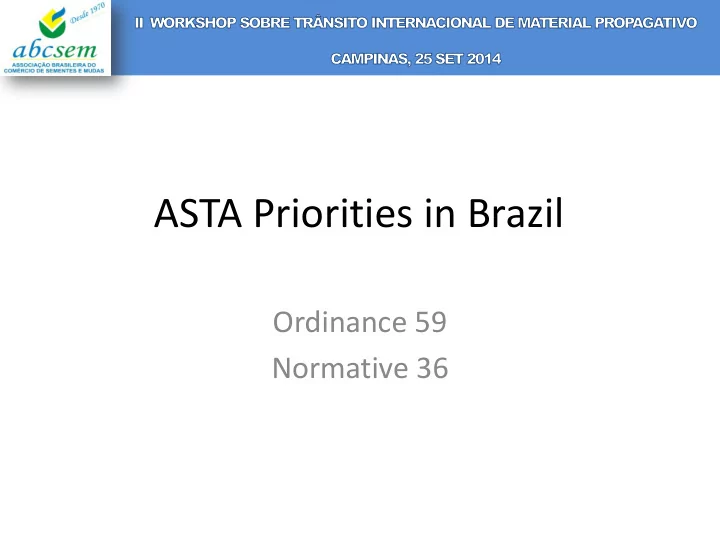

ASTA Priorities in Brazil Ordinance 59 Normative 36
Brazil O-59 • Applies to importation of small seed lots for research, breeding, and trials • Shipments to be subjected to quarantine • Shipments shall be submitted to phytosanitary testing • Shipments of seed not on PVIA list shall be shipped to approved quarantine station and submitted for quarantine testing
Brazil O-59 • Exempted: regulated articles that fall in categories 0 or 1 of phytosanitary risk based on Brazil legislation • Special import permits are required
Brazil O-59 • Initially distributed domestically for comment; informally shared with several other organizations for comment once interest was made known to DSV – ASTA/APHIS – Plantum/ESA – ISF • U.S. companies have recently had difficulty obtaining import permits and complying with phytosanitary import requirements
Brazil O-59 • Small quantities do not lend themselves to phytosanitary testing – sample size may be the entire shipment! • Many shipments are for destructive testing or evaluation under confinement and therefore pose little, if any risk • O-59 needs to conform to new seed ISPM • Process to obtain import permits is very bureaucratic, subject to interpretation, and time consuming – could set back variety development and evaluation activities
Brazil O-59 • USDA APHIS is proposing that Brazil DSV use the U.S. protocol for importing small seed lots – Conditions customized according to risk – Destructive analysis vs. growth in confinement vs. various forms of post entry quarantine
U.S. System for Importing Small Seed Lots • Import permit required, phytosanitary certificate not required • Import permits good for up to 3 years • Seed not of any prohibited species, noxious weeds, not treated, pelleted or coated – APHIS will still issue special permits for prohibited spp but under conditions of quarantine or post entry quarantine • Meets certain packaging and shipping requirements • Up to 50 seeds or 10 grams/packet; up to 50 packets/shipment • Shipped to designated POE
Brazil N-36: Review of the Latest Version of Proposed Rule • N-36 applies to importation of commercial seed • Article 1: defines quarantine pests associated with seed species in annexes to the rule – 1 st draft: 35 country-specific annexes; the US annex contained over 120 pests – 2 nd draft: annexes reduced to one global annex – 3 rd draft: back to country-specific annexes
Brazil N-36 • Article 2: – DA*1: PC stating that seed is free of Q pests – DA2: shipment treated for arthropods – DA5: (Norm 7), Allow Field Inspection for some species of specific origins – DA15: shipment is free from pests identified in the annex based on a lab test OR field inspection OR if applicable, seed was grown in a PFA (ISPM 4) • Shipments will likely be re-tested at POE prior to entry (paid by exporter) * Additional Declaration
Brazil N-36 • Concern that some of the pests listed in annexes are not technically justified • Seed tests are non-existent for many pests • Frequency of re-testing at the POE (original version indicated 100%!)
Brazil N-36 • APHIS/Brazil technical bilateral held May 12, 2014 – Luis E.P. Rangel, new DSV director et.al. • Brazil N-36 still in process; comment period is still “open” for APHIS • APHIS resubmitted all information previously submitted for the record • APHIS preparing additional analyses (July 2014) • ABRASEM/ABCSEM organizing a one day Phytosanitary workshop with MAPA set for September 25. O-59 and N-36 • B-36 continues to be a moving target!
Recommend
More recommend